North Carolina
On Feb. 8, tens of thousands of people gathered in the North Carolina capital city, Raleigh, for what organizers called the Moral March. It was a follow-up to last year’s “Moral Monday” movement that started in April 2013 when Rev. William Barber II, president of the North Carolina NAACP, and 16 others were arrested inside the North Carolina legislature for protesting sweeping voting restrictions proposed by the Republican-controlled state government.
I ALMOST DIDN’T go to the Moral March. I kept looking for excuses. There was all that work to be done for next week. I told my professor I’d miss Friday’s preaching class. I hoped she’d chide me and I’d feel guilty enough to stay. Instead she said, “Great, go with my blessing.” I told my tutor I’d miss tutorial. She said, “I’m so glad you’re going to the march.”
Why couldn’t I go to a normal graduate school where no one left their rooms? But instead I went to seminary, and to Union, of all places!
I said, God, I’m crazy to go. Mild laughter was the only response. I glared at my reflection in the dark window. The reflection raised her eyebrow and said, don’t be left behind now.
The little voice in the window stayed with me as I put an extra pair of thick socks in my bag. Don’t be left behind, reading books about other people’s marches and other people’s spiritual revelations and other people’s religions. This march is historic, my reflection informed me. Go and be part of history. This is your history.
This is your time.


Yesterday, I read about the 2-year old child who shot herself by accident in North Carolina over the weekend. Then I read about the horror of another school shooting in Nevada. Only hours later — shots rang out again on our block in North Philadelphia, for the second time this week. This time a bullet went through the window of one of the houses owned by our non-profit.
I was talking to a friend about my anger over the 300 lives lost in our city this year to gun violence. With the most sincere intentions, my friend said in an attempt to console me: “It’s just the way the world is.”
I’m not willing to give up that easy. It may be the way the world is today, but it doesn’t have to be the way the world is tomorrow.
![Senator Richard Burr photo courtesy US Senate [Public domain], via Wikimedia Commons](https://sojo.net/files/styles/medium/public/blog/Richard_Burr_official_portrait_crop-295x369.jpg)
Citing the need for transparency in the U.S. record on human rights, nearly 200 clergy and religious leaders from North Carolina are seeking the public release of a 6,000-page Senate intelligence report on U.S. torture of terrorism detainees after 9/11.
The letter, dated Aug. 27 and released to the media on Thursday, was sent from the North Carolina Council of Churches in Raleigh to Sen. Richard Burr, a North Carolina Republican who sits on the Senate Select Committee on Intelligence.
The letter, signed by 18 bishops, including the leaders of both of the state’s Catholic dioceses, stated that in light of conflicts in Syria and around the Middle East, transparency on U.S. torture practices was needed.
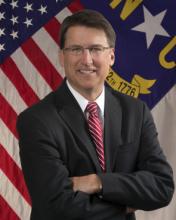
North Carolina became the seventh state to prohibit its judges from considering Islamic law after Gov. Pat McCrory allowed the bill to become law without formally signing it.
McCory, a Republican, called the law “unnecessary,” but declined to veto it. The bill became law on Sunday.
The state joins Arizona, Kansas, Louisiana, Oklahoma, South Dakota, and Tennessee.
Supporters hailed the bill as an important safeguard that protects the American legal system from foreign laws that are incompatible with the U.S. Constitution, while critics argued that the bill’s only purpose is to whip-up anti Muslim hatred because the Constitution already overrides foreign laws.

THOSE WHO BELIEVE in freedom and work for justice in our world sometimes grow nostalgic about the 1960s in this country, looking back at the leadership that emerged from African-American churches in the South, drawing allies from outside the region and beyond the bounds of creed. America has a vivid, living memory of faith inspiring public justice. But the civil rights movement did not just happen. The March on Washington and Selma were moments in history made possible by movements that grew out of hard work over the course of decades.
This summer in North Carolina, “Moral Mondays” at the state General Assembly have drawn thousands of weekly protesters, more than 800 of whom have been arrested for engaging in mass civil disobedience. A few weeks into the campaign, some elders started saying it felt like the ’60s all over again. The Washington Post highlighted NAACP state chapter president Rev. William Barber’s dynamic preaching. The New York Times pointed to the significance of hundreds of clergy uniting to lead the movement. MSNBC andFox News set up their satellite trucks. Week after week, thousands of people kept coming.
When reporters asked why, participants explained the concerns: 500,000 people denied health care when the legislature refused federal funds for Medicaid expansion, 70,000 people whose unemployment insurance was cut off, thousands of poor families denied an earned income tax credit, wholesale repeal of the hard-won Racial Justice Act, and diversion of public education funds through a voucher program. The reasons were legion, but they were not, by and large, unique to North Carolina. They were the sort of changes the American Legislative Exchange Council (ALEC) promotes at the state level throughout the country. How, then, did this grassroots resistance movement emerge in North Carolina?
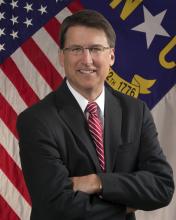
North Carolina Muslims hope they can persuade Gov. Pat McCrory, a Republican, to veto a bill that prohibits state judges from considering “foreign law.”
“It’s going to be tough,” said Rose Hamid of Charlotte. “But I do believe there is a chance.”
Muslims across the state oppose the bill they think is motivated by intolerance and may potentially infringe on other religious groups. Bills against judicial consideration of “foreign laws” are believed to really be opposing Shariah, or Islamic law.

North Carolina lawmakers on Wednesday approved a bill to prohibit judges from considering “foreign laws” in their decisions, but nearly everyone agrees that “foreign laws” really means Shariah, or Islamic law.
North Carolina now joins six other states — Oklahoma, Arizona, Kansas, Louisiana, South Dakota, and Tennessee — to pass a “foreign laws” bill. A similar bill passed in Missouri, but Gov. Jay Nixon vetoed it, citing threats to international adoptions.
The bills all cite “foreign laws” because two federal courts have ruled that singling out Shariah — as Oklahoma voters originally did in 2010 — is unconstitutional.
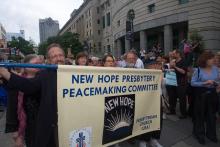
Since state legislators were taken over by the Koch brothers, many progressive clergy have spent our entire discretionary accounts on travel to our state capitals. We attend on behalf of equal marriage, the living wage, campaign finance reform, fracking, or low wage workers. While trying to be faithful, we are, also, in the great words of Joseph Sittler, “macerated” by our citizen involvements.
But an experiment is occurring in North Carolina to de-macerate and reunite our spiritual souls with our political bodies. Instead of episodic lobbying, on Moral Mondays, clergy visit with their representatives as chaplains. They change the language from the pragmatics of the political to the hope of our God. They pass through the wilderness of the secular and its optimism and arrive at the land of hope. They talk about the downtrodden in meaningful ways with state legislators.
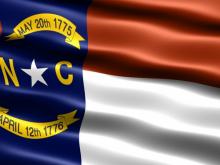
It’s true that by some standards I am not North Carolinian, nor or am I Southern. I was not born there — I have no extended family there. I don’t speak with a drawl. And I don’t (gasp!) like sweet tea or Cheerwine.
But after 14 birthdays, nine years in the public education system, four years at UNC-Chapel Hill, countless pounds of barbecue, numerous trips to the Appalachians and the Outer Banks, and many lifetime milestones — including voting for the first time! — passed in that beautiful state, it is now the closest thing to home I know.

Once we have decided to follow Jesus, we cannot help but live out our personal beliefs in public ways. The demands of the Gospel refuse us the option of a purely inward spirituality.
While there are times when those in power listen to the guidance of moral and religious leaders, far too often we’re asked to be prophets. In the face of opposition, we pick up our crosses and lift up our voices on behalf of the disadvantaged.
In North Carolina, pastors and civil rights leaders, along with thousands of others, have been living out their personal faith in a very public way. Since late April, dozens of faith leaders and hundreds of others have been arrested at the state capitol as part of an ongoing protest call “Moral Mondays.” What would motivate these leaders to take such a strong stand at such a personal cost?
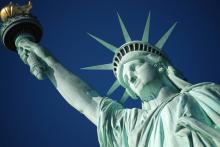
“If you love somebody, set them free. Free. Free. Set them free.” Of all the songs to come to mind during this Independence Day weekend, this one rings in my head. Sting, the artist, did not have America’s freedom celebration in mind when he coined these words. Honestly, the song has little to do with patriotism; it is more of a ballad of love lost and letting go. Nonetheless I dare to invoke it, as the words resonate with the spirit of autonomy that is so pervasive on July 4. “Set them free. Free. Free. Set them free.”
Each year at this time, our country focuses on liberty, the red-white-and-blue, and “My Country Tis of Thee.” I am grateful to live in the U.S. and the freedom this affords. Yet, what about persons who are not so independent — the unemployed who rely on federal subsidies, children whose schools are closing due to no fault of their own, and yes, the millions of Americans in the prison system? Although the Fair Sentencing Act of 2010 reversed the disparity between crack and cocaine convictions implemented by the Anti-Drug Abuse Act of 1986, the prison rate remains exorbitant. More than 2.2 million are still behind bars. The Texas execution rate is at 500 and counting. Forty-eight percent of persons in federal prisons were convicted of drug offenses, according to The Sentencing Project. A reversal in policy three years ago has not flipped today’s prison numbers. So many are not free.
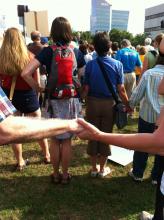
The throngs of demonstrators who flock to the grassy knoll outside the North Carolina Statehouse each Monday know the drill.
They listen to a fiery speech denouncing the Republican majority’s legislative actions. They sing freedom songs and chant civil rights slogans. Then they march two by two into the legislative building to be handcuffed by police and arrested for failing to obey orders to disperse.
Leading them in this weekly rite of nonviolent civil disobedience is the Rev. William J. Barber II, president of the state’s NAACP chapter. Since assuming the state presidency eight years ago, he has waged numerous battles challenging local and state governments to extend educational opportunities, broaden the voting base, provide health care, and more generally lift up the poor.
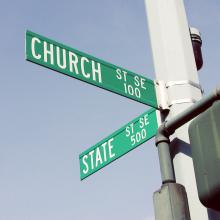
WILMINGTON, N.C. — A resolution to allow North Carolina to defy the Constitution and establish a state-sanctioned religion may be dead in the state capitol, but minority faiths say there’s more than enough reason to remain nervous.
Some worry about the implications the bill has for North Carolina, a majority Protestant state with growing Hindu, Muslim, and Buddhist populations.
Manzoor Cheema, a Raleigh resident and board member of the Triangle Interfaith Alliance, said he believes the resolution should be a wake-up call.
“I think this is a very disturbing development; very bad for our state. In my opinion, as a Muslim, a minority community member and immigrant from Pakistan, I believe that separation of church and state is fundamental and grants us many freedoms,” he said.
“But it’s a blessing in disguise to mobilize the interfaith community in North Carolina.”
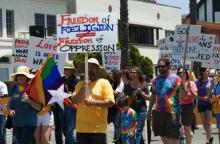
The notion of religious liberty has lately conveyed an impoverished attitude toward the common good among Christians. Namely, “we’ll pay for what we like, and won't pay for what we don’t.”
This stubbornness cropped up last week in College Station, Texas, when the student senate at Texas A&M voted for students to have the privilege of diverting tuition payments from services they object to on moral grounds. Named the “Religious Funding Exemption Bill,” the broadened proposal’s original language (“GLBT Funding Opt Out Bill”) specifically targeted funds going to the campus’ GLBT Resource Center.
Missing from the media coverage was a real look at the bill’s usage of religious exemption — or more specifically, its misuse. In its bill, the student government at A&M confused religious liberty with religious control, and managed to do a good degree of community damage in the process.

After taking my seat in a comfortably worn wingback chair, I immediately noticed a copy of Junot Diaz’s novel, The Brief Wondrous Life of Oscar Wao. My eyes lit up. Having just picked it up the week prior, I suddenly felt an imagined literary kinship with him. Appropriately, Diaz’s novel leaned up against a worn collection of liberation theology.
“How do you like Diaz’s writing?” I asked, hoping a moment of shared appreciation for words and stories would calm my nerves a bit.
According to the Atlantic Cities, lawmakers in North Carolina have chosen to ignore studies that show sea levels are rising faster than previously expected in favor of developing new housing along the coast.
According to the rerport, state Rep. Pat McElraft, a not-scientist, said in a floor debate that the state should assume sea levels will rise at the same rate they have in the past: 8 inches over the past century.
From Kelly Henderson's Switchboard blog post:
"The scientific findings that North Carolina coasts will likely experience a 39-inch sea-level rise created quite a stir and were challenged by NC-20, a coastal economic development group, who cited flaws in the research. The group fears losing dollars if coastal planning begins now to prepare for the 39-inch rise since over 2,000 coastal miles will become restricted to development."
And, from Mr. Colbert, on N.C.'s logic in only considering historical data:
"If we consider only historical data, I've been alive my entire life. Therefore, I always will be."
Sandi Villarreal is Associate Web Editor for Sojourners. Follow her on Twitter @Sandi.

Beloved TV actor Andy Griffith has died, according to news reports. He was 86.
Griffith died this morning.
Former UNC President Bill Friday says The Andy Griffith Show and Matlock actor died at his home in Dare County, North Carolina around 7 a.m.
Friday, who is a close friend of the actor, confirmed the news to WITN News.
This week is one of those weeks where everyone seems to be talking, tweeting and blogging about the same video. I received it from several concerned friends with commentary like, “More bad news from North Carolina,” or “How can a loving God hate so much?” The video, which has quickly gone viral in the past 24 hours, is a clip from a recent sermon by Pastor Charles L. Worley of Providence Road Baptist Church in Maiden, North Carolina.
Following President Obama’s endorsement of same-sex marriage, pastor Worley took to the pulpit to rage against the issue of “queers and homosexuals”. However, it is his proposed “solution” to the “problem” (eerily reminiscent of Hitler’s “Final Solution”) that has the blogosphere abuzz (read: up in arms).
Worley proudly pronounces that he has found a way to get rid of all of the “lesbians and queers”: lock them all inside a fenced-off area and simply wait for them to die out on account of their inability to reproduce. In the video, his pronouncement garnered several hearty “Amens” from the congregation.
Unfortunately, this explosive video is just the most recent in a long stream of gay-marriage-related stories making headlines from my home state of North Carolina. After all, mine is the state that just passed the draconian amendment to its constitution, commonly known as “Amendment One”, banning same-sex marriage and all domestic and civil unions (never mind the fact that same-sex marriage is already illegal in our state). It seems that a day does not go by where I don’t hear a quote or read an article where another pastor has taken to the pulpit to remind his congregation that “homosexuality is wrong and against the Bible!”
This breaks my heart.
The sign outside the polling station at Devon Park United Methodist Church exemplified this state's struggle with a constitutional amendment to ban same-sex marriage.
"A true marriage is male and female and God," the church marquee read. All around the church sign were small campaign signs that read: "Vote Against Constitutional Amendment" and "Amendment One Harms Children Vote Against."
The amendment was approved Tuesday (May 8) by 61 percent of voters, with some counties endorsing it with more than 80 percent of the vote. Only seven counties voted against it.
"In some sense North Carolinians are voting against their own beliefs," according to the Raleigh-based Public Policy Polling firm said. "Fifty-three percent of voters in the state support either gay marriage or civil unions, yet a majority also support the amendment that would ban both."